“There is no health without mental health!”
Recently, in the days before Mother’s Day, I was captivated by the delightful aroma of fresh flowers at the nearby shops.
The potent aromas of roses, carnations, and lilies reminded me how floral scents can profoundly impact our emotions, calm the mind, and alleviate stress.
 I cherish the Mother’s Day tradition of giving and receiving flowers as an acknowledgment of love from my family. Beautiful to the eye and uplifting to the soul, I am pleasantly delighted when my smiling son presents me with a fragrant bouquet, filling my heart with joy.
I cherish the Mother’s Day tradition of giving and receiving flowers as an acknowledgment of love from my family. Beautiful to the eye and uplifting to the soul, I am pleasantly delighted when my smiling son presents me with a fragrant bouquet, filling my heart with joy.
We can all appreciate the beauty and natural fragrance of flowers. Despite being frequently overlooked, their scents possess powerful therapeutic effects on mental health.
In this Blog, I will discuss the benefits of specific essential oil scents, how they influence neurotransmitters, and how they can improve mental health and overall wellbeing during Mental Health Awareness Month.
Pause & Smell the Flowers
At Fleur, we believe in the power of Aromatherapy to positively impact one’s mental and emotional state and bring joy to one’s life.
We all know the importance of physical health. However, nurturing our mental health is essential for living a balanced and fulfilling life.
As an integrative mental health professional, I often encourage my clients to “smell the flowers.” As you probably have discovered, floral scents have a remarkably soothing effect on the nervous system, mind, and body. Visiting a florist’s shop or a blossoming garden and inhaling delightful aromas can help you relax, refresh, and recharge.
Nonetheless, harnessing the power of scent to support mental health is a time-honored practice deeply rooted in traditional and contemporary Aromatherapy.
Mental Health Stats
Did you know that nearly one in five adults in the US has a mental health condition?
And, did you know that one person has family, friends, and others whose lives are touched by their condition, even if they don’t themselves suffer from one?
You might be surprised by how prevalent mental health conditions are among adults in the US.
On average, depressed individuals miss an average of 4.8 workdays and suffer from 11.5 days of reduced activity over three months.
 Here are the stats:
Here are the stats:
- 48 million have an anxiety disorder
- 21 million have major depression
- 9 million have post-traumatic stress disorder
- 7 million have bipolar disorder
- 3.5 million have borderline personality disorder
- 3 million have obsessive-compulsive disorder
- 1.5 million have schizophrenia.
Unfortunately, misconceptions about mental illness can have significant effects on everyone, impacting caregivers, friends, loved ones, and our communities.
Additionally, patients with chronic or long-term illnesses face an increased risk of developing debilitating medical conditions. Thus, addressing this risk and establishing preventive treatment measures is crucial.
We must acknowledge the daily mental health and illness and its impact on millions of people daily. A deeper understanding of these conditions is crucial to improve support and assistance.
**If you are facing a mental health emergency, please call 988 for crisis intervention.
Depression Can be Paralyzing
Happiness may seem attainable for others, but the heavy feeling of sadness is a weight that lingers. People experiencing feelings of emptiness, hopelessness, and frequent crying may also become easily annoyed, angry at small things, or spend their days sleeping.
Depression has many aspects, but these are a few common signs.
The mind tends to focus on persistent ill feelings, which can easily become a habit. Dwelling on negativity actually makes us more ill. The relationship between the two is cyclical and almost paradoxical. Is being negative a symptom of depression?
Yes, but the opposite is also true – depression leads to negative thinking.
Constantly dwelling on the past can lead to feelings of depression. Ruminating about the future can be a source of anxiety. Either will make your symptoms worse.
Negative thought patterns, or cognitive distortions, can manifest as incorrect assumptions, unrealistic self-criticisms, and even the denial of reality itself. Yet, the effects of this thinking can be all too real for someone struggling with their mental health.
If you are struggling with persistent feelings of overwhelming sadness and anxiety, consider implementing a multifaceted approach to talk to a professional about your thoughts and feelings.
Adding Flower Essence Aromatherapy can help restore balance between mind and body, interrupt patterns of negative thinking, and boost energy levels.
By supporting your mental and emotional health from various perspectives and an integrative approach, you can significantly reduce depression and naturally increase your energy levels, thus creating positive feedback loops instead of negative ones.
Allopathic vs Complimentary Mental Health Care
For context, from an allopathic perspective, balancing brain chemistry is the goal of mental health treatment.
Allopathy, also known as conventional medicine or mainstream medicine, is the treatment of disease by traditional means, using drugs to alleviate symptoms.
Complementary and Alternative Medicine (CAM), on the other hand, includes various non-conventional medical modalities, practices, and products.
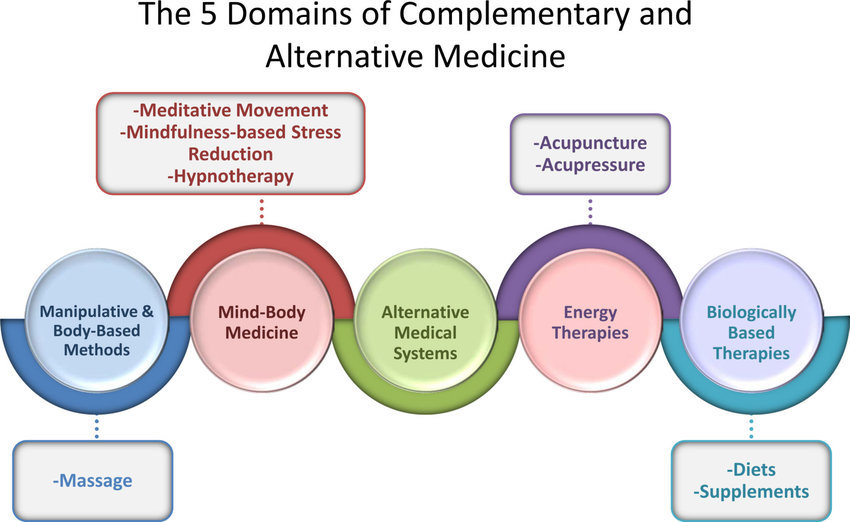
The Five major domains of CAM:
- Alternative medical modalities
- Mind-body interventions
- Biologically-based treatments
- Manipulative and body-based methods
- Energy therapies.
CAM Therapies include:
- Aromatherapy
- Homeopathy
- Traditional Chinese Medicine & Acupuncture
- Ayurveda
- Herbalism
- Energy medicine
- Indigenous practices
- Mindfulness
- Body-based therapies, i.e., chiropractic, massage, yoga, biofeedback, etc.
These therapies help restore balance to the mind and emotions. Furthermore, holistic lifestyle approaches such as diet, exercise, and sleep can significantly enhance CAM therapy.
Integrative Medicine
Integrative medicine’s fundamental principles involve a collaborative partnership between the patient and the practitioner in healing. This approach combines traditional and alternative methods to promote the body’s natural healing process. It considers all lifestyle factors affecting health, including the mind, spirit, community, and body.
My counseling practice is based on this model. Integrative psychotherapy underscores the importance of evidence-based practice.
An integrative approach welcomes new ideas and prioritizes using natural and minimally invasive treatments whenever possible. From this perspective, we also focus on promoting health and preventing illness in the body, mind, and spirit.
Mental Health is Whole Health
Understanding and prioritizing your mental health is essential for living and managing life’s many experiences. Because external stressors influence many aspects of life, you must become aware of your thoughts, feelings, and emotional triggers related to those experiences.
Many strategies can help you achieve balance and cultivate resilience to navigate life’s challenges. With the increasing complexities of modern life, more people are becoming aware of the influence of mental health on physical health.
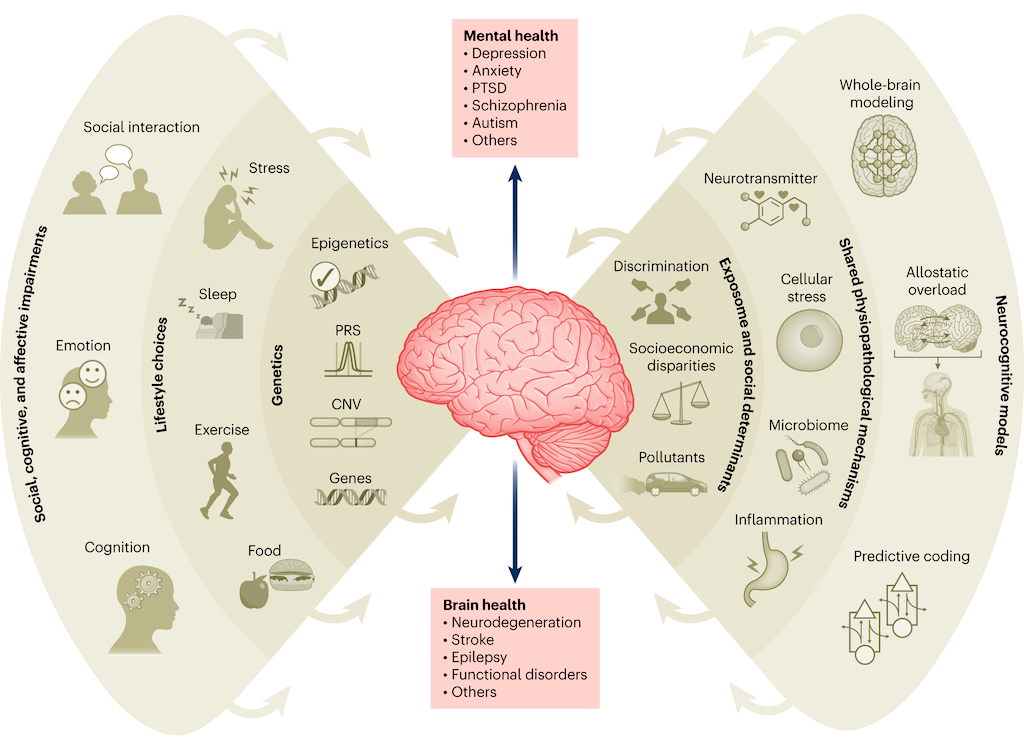
Mental health resilience is developed over time by consistently applying specific practices within a structured process. Mental wellbeing enables people to cope with life’s stresses, realize their abilities, learn and work well, and contribute to their community.
As you can see, sound mental health is crucial for life. Your investment in your mental health empowers you to collaborate with healthcare providers to enhance your long-term health.
Improved mental health leads to resilient, healthy people and communities that contribute meaningfully to society.
Understanding Psychiatry
Psychiatric care, including integrative psychiatry, is increasingly being sought by patients worldwide. Psychiatry is the medical specialty dedicated to diagnosing, preventing, and treating harmful mental conditions, including substance use disorders.
Mental illness, also known as a mental disorder, mental health condition, or psychiatric disability, is a medical condition that affects a person’s thinking, emotions, or behavior. Also referred to as affective disorders, they are a group of psychiatric illnesses that severely impact mood and its related functions.
A mental disorder is a clinically significant disturbance in an individual’s cognition, emotional regulation, or behavior.
Because psychiatrists are physicians, they can diagnose mental health issues and prescribe a range of pharmaceutical medications. Some individuals also choose to incorporate psychotherapy into their treatment plans.
Over the past several decades, we’ve seen an increase in medications for serotonin and dopamine imbalances. These prescriptions can treat symptoms of many mental health conditions.
I believe that there is a time, place, and appropriate conditions that justify the use of these powerful medications. Yet, they have a long list of potential side effects. Also, medication effectiveness varies from person to person.
*However, it’s important to emphasize that for severe mental disorders, one should not attempt to discontinue medication without the monitoring of a physician.
Molecules of Emotion
I love essential oil science! Research has proven that essential oils boost serotonin and dopamine levels, resulting in a sense of happiness and overall wellbeing.
Endorphins, known as the “molecules of emotion,” are potent neurotransmitters that alleviate pain and promote feelings of pleasure.
Neurotransmitters are vital chemical messengers that your body cannot function without. They bind to specific receptors, triggering actions in target cells. After conveying their messages, the body breaks down or recycles them.
Clinical Aromatherapy research suggests that smell can affect neurotransmitters and provide an effective treatment for a range of psychiatric disorders without the adverse effects of many conventional psychotropic drugs.
Dopamine and Serotonin – Brain Hormones
Brain hormones and neurotransmitters help the brain process, evaluate, and communicate experiences. Each hormone has a specific function that activates how we feel, as you can see below.
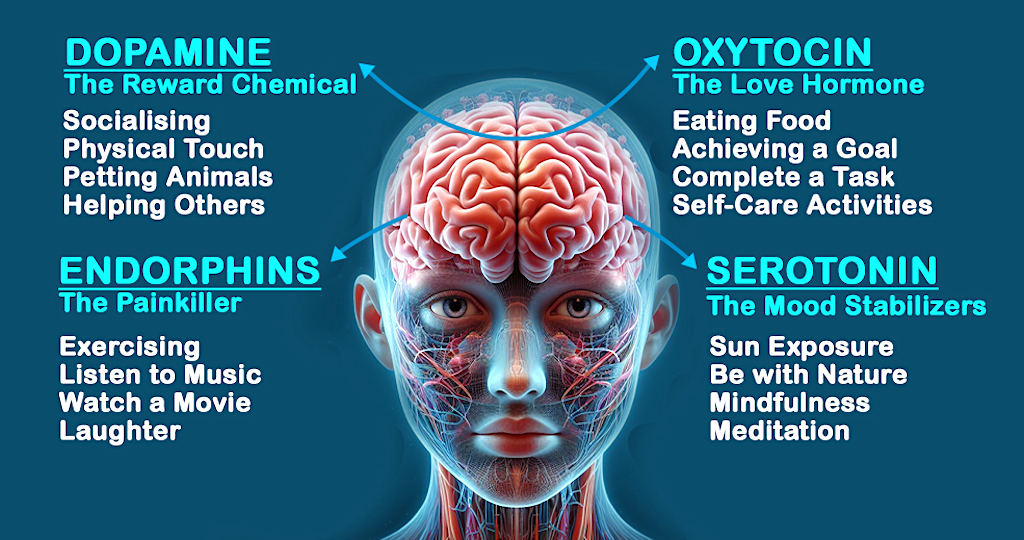 Two primary neurotransmitters, dopamine and serotonin, are often called the “happy hormones.” These play a crucial role in numerous essential body processes, including their positive effects in regulating mood.
Two primary neurotransmitters, dopamine and serotonin, are often called the “happy hormones.” These play a crucial role in numerous essential body processes, including their positive effects in regulating mood.
Dopamine is often referred to as a “feel-good” hormone because it provides a sense of pleasure. It plays a vital role in the brain’s reward center, governing processes related to motivation, desire, and cravings. Additionally, dopamine is essential for fundamental processes such as movement, sleep, arousal, memory, attention, and cognition.
Serotonin, often called the “feel-good” neurotransmitter, regulates mood and plays a vital role in digestion. The lack of serotonin is believed to play a critical role in the development of depression, anxiety, and other mental health conditions.
Integrative Psychotherapy
Psychotherapy, known as “talk therapy,” benefits differ for each person. Talking about your feelings, life, and problems can help, while also addressing stress factors that worsen depression and anxiety.
However, most people want to
- Feel calmer, more relaxed, and in control of their life.
- Feel happier and more optimistic about their future.
- Feel increased self-worth and confidence.
- Have better relationships with their spouse and children.
- Achieve more balance between your work and home life.
From an integrative perspective, it also includes anchoring lifestyle choices with therapy goals.
As a practicing integrative psychotherapist working with clients, I have years of experience working with clients who have been receiving psychiatric care for many years. These individuals are seeking non-pharmaceutical methods to enhance their mental wellbeing and a personalized treatment plan with empowering tools and resources.
Resilience means being able to cope with challenging events. When something terrible happens, you still feel anger, grief, and pain, but you’re able to keep going, both physically and psychologically.
Resilience is not just about enduring something difficult or coping alone. It’s about finding strength and support to overcome challenges.
Working with each client’s unique mental and emotional states and discovering the perfect aromatic blend can ease psychological reactions and have a subtly powerful impact.
Using Aromatherapy for Holistic Mental Health
Aromatherapy methods are highly effective in treating medical conditions such as pain, anxiety, depression, and insomnia. This ancient art form is used worldwide to harness the healing power of essential oils.
Clinical Aromatherapy involves using essential oils to achieve specific, measurable physical or psychological effects. Also known as essential oil therapy, it focuses on improving mental and physical health. This approach is used worldwide to manage chronic pain, alleviate depression, reduce anxiety, improve cognition, insomnia, and stress-related issues.
What’s more, Clinical Aromatherapy is one of the fastest-growing complementary therapies worldwide. It is one of the primary complementary therapies in patient wellness programs practiced by nurses and other healthcare professionals in hospitals, hospices, and community settings.
 The choice of essential oil is often based on its chemistry, which indicates its properties and the safest method of use. It also considers the patient’s likes and dislikes of smell.
The choice of essential oil is often based on its chemistry, which indicates its properties and the safest method of use. It also considers the patient’s likes and dislikes of smell.
Smelling various scents can improve physical and psychological comfort. Studies have confirmed the central role of aromatherapy in uplifting moods and soothing stress.
Incorporating natural, organic therapeutic oils into mental health practices can effectively regulate emotions by targeting the limbic system.
Accessibility, versatility, and proven benefits make Aromatherapy a valuable tool for professional wellbeing in the modern age.
Aromatherapy is Aromachology Wellbeing
Our sense of smell is an undeniable source of pleasure and information. It is the only sense directly linked to our brain. It is a physical sensation that shapes our responses to various stimuli (triggers).
Aromachology, or aroma+psychology, is the scientifically observable influence of smell on the mind and emotions. The term highlights the psychological benefits of aromas and delves into the psychological impact a scent can have on the brain.
Aromachology focuses on how different scents affect our nervous system. Certain scents can trigger the release of neurotransmitters such as serotonin, dopamine, and endorphins in the brain, leading to feelings of happiness and relaxation.
Aromachology and Aromatherapy are powerful complementary tools in treating psychological disorders. Using essential oils to access our emotional and memory pathways by targeting the limbic system offers a natural approach to managing and fostering mental wellness.
Which Essential Oils are Best?
From a psychological perspective, the sense of smell is directly linked to our brain’s reward system, making it worthy of stimulation and having therapeutic potential.
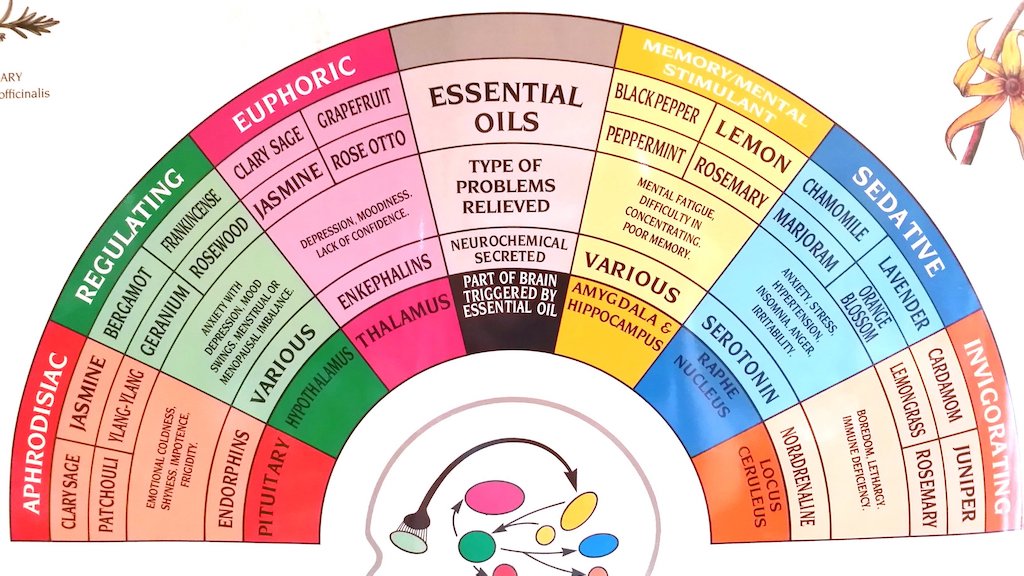 Natural organic plant essential oils can modulate neurotransmitter activity and contribute to managing mental health disorders by promoting a more balanced and stable neurotransmitter profile, ultimately supporting better mental health.
Natural organic plant essential oils can modulate neurotransmitter activity and contribute to managing mental health disorders by promoting a more balanced and stable neurotransmitter profile, ultimately supporting better mental health.
For example, the fresh scent of citrus oils, such as bergamot, lemon, orange, grapefruit, lime, and tangerine oils, smells like sunshine. These oils are known to boost energy and improve mood, reducing depression. Citrus oils may promote the release of serotonin, which is associated with mood elevation and a sense of wellbeing.
Other oils might influence the production or activity of neurotransmitters like dopamine or norepinephrine, which are also involved in mood regulation and motivation through our reward centers.
For example, essential oils like lavender, chamomile, rose otto, frankincense, geranium, neroli, sandalwood, vanilla, and ylang-ylang are known for their calming properties, which reduce stress and anxiety.
Other essential oils, such as peppermint and rosemary, can help improve mental focus and concentration and are helpful for those with ADHD or other attention disorders, such as dementia.
Many scents belong to multiple fragrance families, offering various wellness benefits from a single essential oil. Lavender essential oil is incredibly versatile for this purpose.
Distilled from the plant Lavandula angustifolia, Lavender oil promotes relaxation and has been backed by clinical research for its effectiveness in reducing stress, anxiety, depression, and insomnia.
When essential oils are combined synergistically in a formulation of one or more essential oils, their enhanced properties shine.
Please remember that essential oils are highly concentrated, so only a few drops are usually required. They should never be ingested.
Fleur Alchemical Wellness Care for Mental Health
Our various care products are tailored to address your emotional wellbeing and state of mind. Safe and user-friendly, these products are great for balancing the mind and emotions. They are safe to use in diverse settings and for different age groups.
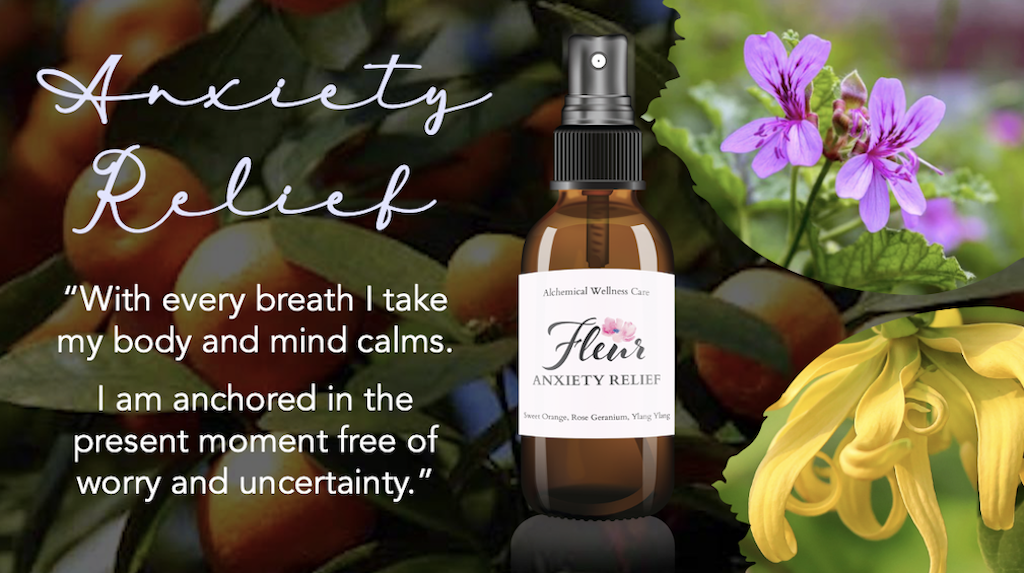
One of our best sellers is Anxiety Relief Spray. This soothing spray is formulated with organic essential oils of Sweet Orange (Citrus sinensis), Rose Geranium (Pelargonium graveolens var. roseum), and Ylang Ylang (Cananga odorata) preserved with 1% organic, biodynamic grape alcohol.
Recently, I created Anxiety Relief Vibrational Tincture to provide relief for individuals who are chemically sensitive, infirmed, pregnant, or are children.
Like our Anxiety Relief Spray, this liquid tincture has a calming effect. It is formulated with a proprietary combination of vibrational and wildflower essences that energetically relieve the worried mind gripped by anxious, fretful, and recurring thoughts.
Our luxurious Body Oils are expertly crafted with a nourishing jojoba base and infused with essential oils for optimal transdermal delivery.
Praśānta Calming Body Oil is formulated with organic essential oils of Sweet Orange (citrus sinensis) and Lavender (Lavandula angustifolia).
Shanti Serenity Body Oil is formulated with organic essential oils of Lavender (Lavandula angustifolia), Neroli (Citrus aurantium var. amara), Myrrh (Commiphora myrrha), Clary Sage (Salvia sclarea), Melissa (Melissa officinalis), and Bourbon Vanilla (Vanilla planifolia).
Rajeunir Energy Body Oil is formulated with organic essential oils of Lemon (Citrus limon), Juniper (Juniperus communis L), Peppermint (Mentha piperita), and Rosemary (Salvia rosmarinus ct verbenone).
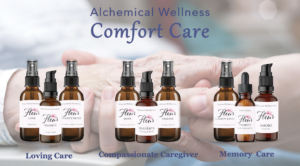 Furthermore, the use of aromatherapy massage and aromatherapy inhalation may be helpful for older adults suffering from anxiety and depression.
Furthermore, the use of aromatherapy massage and aromatherapy inhalation may be helpful for older adults suffering from anxiety and depression.
Caregivers across the US are using our Comfort Care Kits in memory, hospice, palliative care, and home care settings.
Scents I Love
I am partial to floral scents, and like Fernand the Bull, I could happily smell these delightful scents all day. Formulating with floral essential oils to bring forth their combined aromas is a joy that resonates with my soul.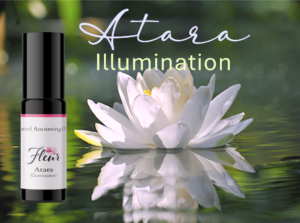
I rarely feel sad; my thoughts are mostly positive, and my energy is high. Could it be the scents I smell?
Familiar floral scents, such as rose, ylang-ylang, chamomile, neroli, jasmine, clary sage, and white lotus, promote feel-good endorphins that help relieve stress and evoke euphoria.
My most recent creation is Atara Illumination, a Sacred Anointing oil blend of white and blue lotus, vetiver, and moringa oil formulated to relax and open the mind. Its scent evokes a higher vibrational reality where love, compassion, and unity consciousness exist.
Essential Oil “Energy”
Every living thing pulsates with energy, and all energy contains information. An energy field surrounds our physical bodies to interact with the vibration of essential oils, receiving impulses and translating them into a unique message. There is continuous communication between an individual and an essential oil.
Essential oils act on the respiratory and olfactory pathways in the human body. They contain volatile molecules that quickly diffuse at room temperature, allowing the scent molecules to bind to the receptors in our noses. Scent molecules travel from the olfactory nerves to the limbic brain, especially the amygdala, the emotional center.
An intricate web of interaction connects all life into one vase self-maintaining system. Like a hologram, every part is related to every other part.
Recognizing nature’s gifts as sources of energy that can influence our experiences, we may access our inherent healing ability and the natural support these scents offer.
For the Mind, Body & Spirit
Adding organic essential oils to a base lotion or oil provides therapeutic absorption through the skin. The topical application allows the essential oil molecules to enter the bloodstream and cross the blood-brain barrier, potentially balancing specific brain regions.
At Fleur, we carefully select suppliers that provide only the finest, pure, unadulterated organic essential and base oils that maximize achieving a therapeutic outcome.
It’s important to note that some essential oils can be hazardous and toxic, with potential hazards such as flammability, skin dermatitis, phototoxicity, and oral toxicity. When essential oils undergo chemical alterations or are produced synthetically, they can significantly impact their interaction, negatively affecting one’s health.
The adverse effects could aggravate current problems, resulting in headaches, allergies, and deteriorating mental health instead of bringing relief.
My Blog written last year, Aromatherapy Mental Health, delves into the toxicity issue.
Summary
Aromatherapy’s multifaceted mechanisms involve the intricate interplay between scent, emotions, neurotransmitters, and physiological responses.
Our Alchemical Wellness Care collection of Body Oils and Sprays supports your mental health. Whether you inhale the scents or absorb the essential oils through the skin, each product in our collections is formulated with your wellbeing in mind.
By targeting these mechanisms, Aromatherapy and Aromachology offer a unique and holistic approach to supporting integrative mental health and wellbeing, making it a valuable complement to conventional psychiatric treatments.
Aromatherapy research continues to investigate the therapeutic properties of essential oils, shedding light on new ways Aromatherapy and Aromachology can enhance mental wellness.
Additionally, integrating Aromatherapy into conventional healthcare settings, such as hospitals and hospices, is gaining momentum, further legitimizing its role in mental healthcare.
Ultimately, Flower Essence Aromatherapy restores wholeness, helping you feel better, sleep better, look better, smile more often, and feel happier.
Let’s prioritize our mental health by embracing the advantages of organic essential oils and effective Aromatherapy. Using a holistic approach Aromatherapeutic approach to mental health, we can reduce stress, conquer anxiety, lift depression, and stay motivated to live our best lives!
Join me in smelling the flowers.
All my aromatic love,
Vidya

